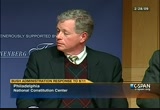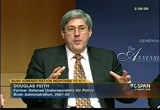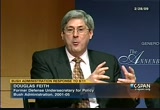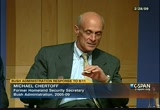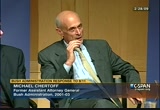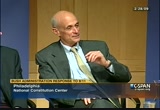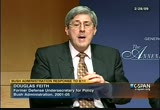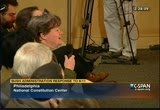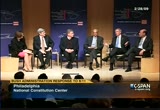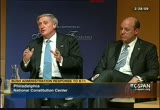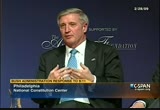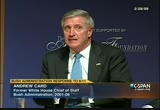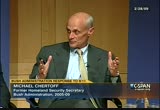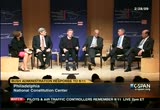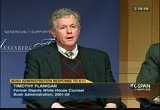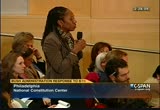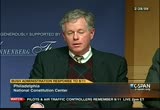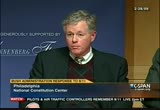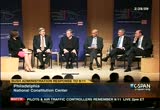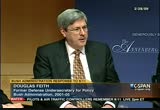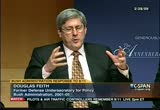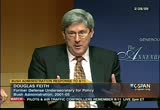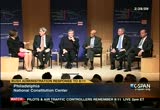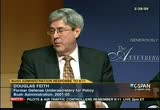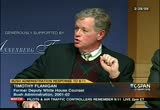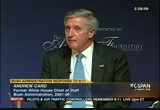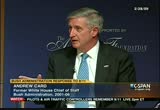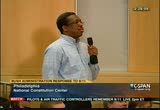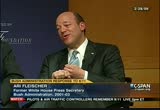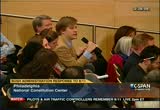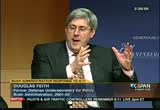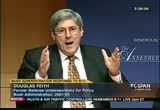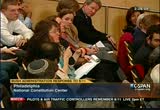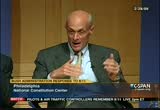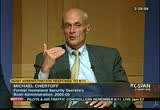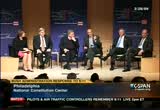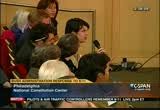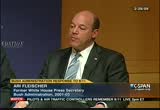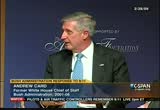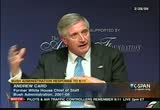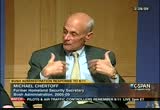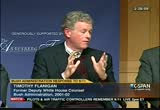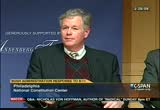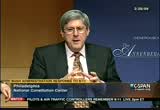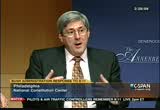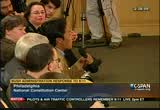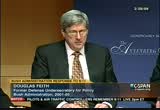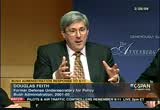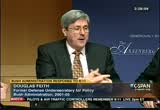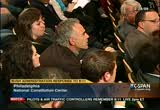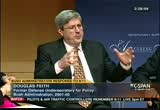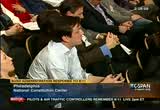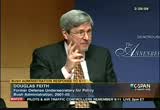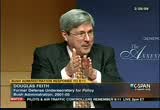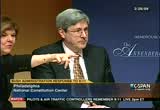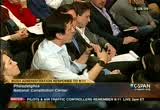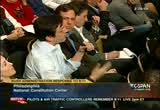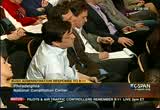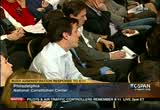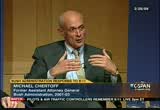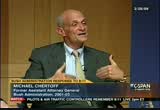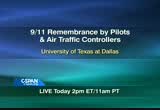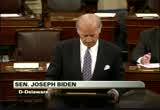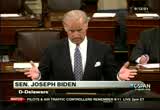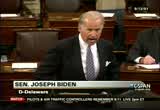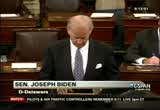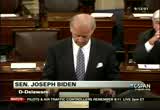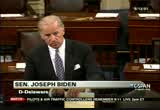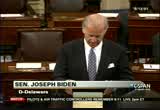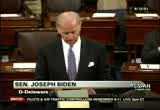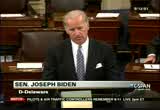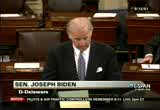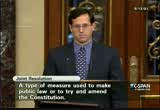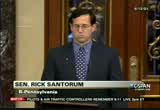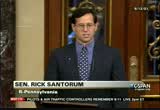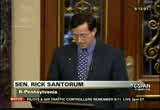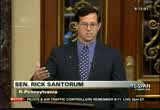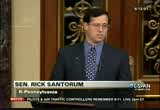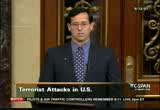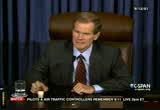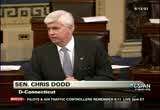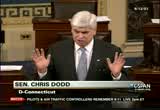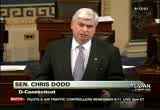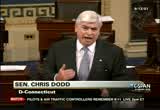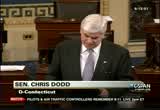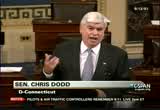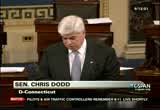tv C-SPAN Weekend CSPAN September 11, 2010 12:30pm-2:00pm EDT
12:30 pm
search warrants and other kinds of legal tools to get the information. second, he had to be able to manage the legal authority to detain people either under the criminal court immigration laws. -- under the criminal or immigration laws. >> it was both in the sense that the same investigative methods, careful police procedures and what not that would be used in any crime scene were used in connection with this event. mike does mention the excellent work that the fbi did piecing together the puzzle that led to the identification of the terrorists within a short period of time. however, the preventive side of
12:31 pm
it definitely became more of a military exercise. even in that regard, the fbi and department of justice had central roles to play to develop a strategy that could be implemented to look at our borders. >> there had been a number of terrorist attacks. there were the embassies in east africa. the first world trade center attack. you could even go back to the u.s. marine barracks bombing in beirut in 1983. in every case with the united states government did principally was to send out the
12:32 pm
fbi to try to find people you could identify as perpetrators so that they could be captured and prosecuted. what you hear from all of the discussion and is very important for people to focus on is that this was a different case. this was not about going out to find people who did it to punish them. we expected further attacks. there was enormous uncertainty. this was a major blow on the homeland. unlike the first world trade center bombing, it was successful. it caused us to completely rethink the terrorism danger. terrorists have traditionally gone after small targets like the ticket counter in an airport or blowing up a school bus. this was the first successful attack of terrorism of mass destruction. in what was the single most
12:33 pm
important decision he made as president, he said the purpose of our reaction to 9/11 was to prevent the next attacke. no president of the united states had ever reacted to a terrorist attack by saying that the purpose of the united states was to prevent the next terrorist attack. that was an enormously ambitious goal. i would say that is what immediately lifted you out of law enforcement. you are well beyond law enforcement into a war on terrorism. i say we have to prevent the next attack, the president was also broadening the focus of people in the government beyond the specific people and group that perpetrated the 9/11 attacks. the next attack might come from al qaeda. it might be related to the taliban that gave safe-haven to al qaeda. but it might come from another
12:34 pm
terrorist group. there might be other state supporters involved. that immediately broadened the effort. >> let me give you a sense of the thought process at the time. the prevention issue in real time -- imagine if another attack had come the next day and the next day. it would have been devastated to the country. it would have shaken the foundations and faith of people in the government. the ability to react and use every tool in the toolbox to stop something from happening is to my mind may be the main reason for the existence of the state, to protect people from attacks. >> i am going to open it up. >> i was thinking to myself what would happen if it had been followed by september 12,
12:35 pm
september 13. what would have happened to constitutional protections in those circumstances? what should we risk happening with our ability to respond to a crisis at that time? >> if we have had follow on a ttacks, the public demand to do additional things would have been overwhelming. there would have been a perception of the fundamental failure of government. i think one attack was bad enough. the critical thing under estimated is the president's restoration of faith in the government in a short period of time. had we not have that and had a series of attacks, i think this country with very different than it does now. i think the public would have been -- back to what franklin roosevelt did in the second world war. i think he would have started to see calls for that. one thing the president did
12:36 pm
quickly was say that this is not about muslims. it is not a war against islam. it is terrorists. he bounded the enemy because we did so it did not become everyone of a certain background -- he down to the enemy so it did not become everyone of a certain background. the present separated those who carried it out from the larger pool. take yourself back to what roosevelt faced. if we had a series of tax and the government could not have prevented an attack the next day, the public would have started to question result in the 1940's. that would in a much greater departure from our constitutional system. >> if we had a succession of attacks, that would have escalated demand for it?
12:37 pm
>> one of the things we discussed intensely in the first few days after 9/11 was that if there were to be a series of attacks on the united states, we were all conscious of the fact that even lesser attacks had triggered major changes in the way we all dealt with airports. you have to be pretty old to remember that there was a time you could go to the airport and catch an airplane the way you catch a bus at a bus station. beginning in the late 1960's and 1970's when terrorism and hijacking picked up, people started having to go to the airport an hour before a flight. that is an enormous amount of personal hours. it really changes life. one thing we were aware of is that even when the hijacking
12:38 pm
dangers diminished, those security measures remained in place. we discussed the fact that it there were to be a series of attacks, you could have really severe security measures put in place that would have major constitutional implications with invasion of privacy and possibly ethnic profiling and other extremely undesirable things people might demand as necessary even though they are undesirable. even when the threat might diminish, you would not necessarily go back. there is a possible ratchet effect with some of the measures. that was a major concern. we basically viewed the stakes in this war as the free and open nature of american society. that is something the president incorporated into his big speech to congress on september 20. he basically defined the war aim of the war on terrorism as
12:39 pm
preserving the american way of life as a free and open society. he basically defined the war with reference to constitutional protections. >> we have another question right here. >> i am margo pearson. i am one of the fellows here this weekend. i want to thank you for coming. this is very educational, especially for someone who has not had nearly as much exposure to washington and these activities as my colleagues have had. my question is with regard to prevention. i appreciate what you are saying with regards to what could have happened with september 12 or september 13. i did not know if my brother was in the trade center when it went down. he had an office there. i was riveted by television just like everyone else. one of the things that flashed through my mind is that in this
12:40 pm
country we have a lot of experience with other countries to face terrorism on a regular basis. israel is one example. they cannot prevent attacks. what makes it possible for us to think that we could prevent attacks either then or in the future? >> andy? >> the president does not have the luxury of saying maybe we can not do it so i will not do my job. the present as a lonely job. when they campaign, they want everyone to love them. it is a love in, but the job itself is very lonely. the decisions are so tough. the president should not be making an easy decision. governments make easy decisions. presidents make tough decisions.
12:41 pm
one of the toughest decisions is the job description. the job description is the shortest for anyone who serves in government, preserve, protect, and defend the constitution. that is the oath of office. that is the job. there is no conditional clause to it. it does not say "if." "if this is easy." "if the lawyers have time to look at it." the president is faced with an obligation to protect us. he will want to know every tool in the toolbox and how he can use them. if he needs more tools he will ask for them. he will ask lawyers or congress to give him more tools. it is not an option of st., "is too hard and i will not do it." israel does a phenomenal job of protecting the state of israel. they do not prevent every terrorist attack, but they do a
12:42 pm
very good job of protecting the national interests. we did study israel. >> but he did ask for and get tools like the patriot act. some people challenge it as reaching too far. the president was very angry when the national surveillance story came out. >> i believe the president's obligations are truly the president's obligations. yes, he asked for more tools. he also did his homework and have other people do their homework. one of the president's the other presidents -- what are the precedents that other presidents have faced? they frequently had to challenge the mind set of congress and the
12:43 pm
american people to do what they thought was the right thing to protect the country. every president will face that. i honestly believe the president did not over reach. he was reaching as far as he thought he had to protect us -- in order to protect us. i happen to think the page. act was very important. he did use tools -- i happen to think the patriot act was very important. notdid use tool mons envisioned earlier. we are a digital society. almost all of our laws are related to analog or written conversations. 1's that did not even a
12:44 pm
originate in the united states. these were tricky laws. he did the right thing in saying he wanted to use every law available to protect us. >> i am sometimes credited with being one of the authors of the patriot act. if you read the act, it is remarkably non-controversial. most of it is an attempt to facilitate information sharing between different parts of the government so we do not have one hand not knowing what the other does. we can do things in the digital age we could not do in the analog age. if we can do something to catch a drug dealer, we should be able to do at least that much to catch a terrorist. the critical thing is that congress passed it overwhelmingly. after a considerable amount of discussion that went back and forth. i do not think anyone has ever successfully challenged the constitutionality. i have observed that people have
12:45 pm
attributed to it things that have nothing to do with it. people say it authorized the war against iraq. i have heard people say it overruled the fis tha law. none of that is true. it was a statute of congress. the president went to congress and got them to sign onto this. >> that touches on the broader issue of the president's decision making in this area. it has been portrayed as they go along assertion of executive power, naked or otherwise. it was the country. the president knew where he needed additional help from the coordinate branches, particularly congress. he went after that help. he went after that in the case of the petrie back. it took a while. when you get congress involved, it takes months to craft a bill
12:46 pm
that can pass both houses of congress. it did in fact take months. we gave maybe to 0.3 nanoseconds of consideration -- 2.3 nanosecond's of consideration as to the authorization of military force. we went up and negotiated that with congress. we arrived at a very broad but appropriate brand of authority for the president in that. getting congress involved is extremely important. >> next question. >> thank you and good evening. i am a professor of law at the university of maryland school of law. you have been speaking mostly about the first 48 hours after 9/11. i do have a brother who worked
12:47 pm
at the trade center. i and many others remember what those first 48 hours felt like. i was very happy to hear you talk about the beginning of the language of the war and terror. what happened on 9/11 began a chain of events that carried through the two terms of the bush administration into guantanamo and afghanistan and so forth. we are the national constitution center. it would be foolish to pretend there are not many americans to disagree with you about whether you secured the constitution. many people believe you failed in protecting the constitution. given the strong feelings and importance of the issues, i wonder if any of you would tell us whether you would be willing to testify before the truth commission if one is created to get a full and complete airing of all of these issues so that all of the american people can
12:48 pm
hear your answers. [applause] if you have objections, why would you object? >> let me first say thank you. i appreciate the spirit in which the comment is offered. realize there are strong differences of opinions within the legal academy and with americans. some believe too little was done. some believe too much was done. the division tends to be along political lines, but not entirely. as to whether or not this is the proper subject for investigation, it has been investigated by congress. many different decisions have been analyzed by congress. i anticipate that will continue. whether a truth commission is the right proceeding, i leave that up to congress to make the
12:49 pm
decision. you ask whether i will be willing to testify. i think any decent truth commission will have subpoena authority. it will be a case of showing up and telling the truth. that is what i would do. i believe my former colleagues from the administration would do that. i have to live with myself. i am perfectly confident that the decisions made during my time in the government were made with the best intentioned to the relevant constitutional legal authority. [applause] >> we have another question. >> good evening. peter coleman from the private school of journalism at columbia university. thank you for your opinions. this question is directed towards mr. feith.
12:50 pm
when did you first speak with the secretary of defense after the terrorist attack? could you talk about your idea of the defense department and other things eventually led to the publication of the 2003 national security threat? >> i got back to washington in the late afternoon of september 12. the first thing i did on getting back was race back to the pentagon where the president have the 6:00 p.m. meeting with the secretary of defense, the joint chiefs of staff, and basically the whole civilian and military leadership at the pentagon.
12:51 pm
i managed to get back in time for that meeting. i assume that is where i had my first words after the attack with deputy secretary wolfowitz and secretary rooms filled and others at the meeting. -- secretary ron spelled -- rumsfeld and others at the meeting. i am a little unclear about your question. it was put together by agencies. the national security staff took the lead and circulated drafts. they had meetings with representatives from the defense department, cia, and other relevant agencies. >> let me ask about the debate inside the administration of what to do with holding battlefield combatants. where did the phrase come from?
12:52 pm
how did we eventually get to having the present at guantanamo? >> in late 2001, the fighting in afghanistan began on october 7. it was less than a month after its september 11. by late november and december, we began to have people that we were holding in afghanistan. it was clear that since we were focused on preventing the next attack -- we have to keep coming back to that. it was an extraordinary mission that we were told given -- all given. it was quite clear that the key to preventing the next attack was intelligence. this was a different war from the cold war or you could see with your enemy was going to attack you because there would have to move heavy armored
12:53 pm
divisions and you could see it from satellites. intelligence needed here to wasent the next attacke likely going to come from interrogating people we were capturing. centcom had a major combat mission in afghanistan. he was holding on to these people. detaining and interrogating them was a major mission. it was hard for them to do on top of their other missions in afghanistan. the asked to get the people taken off their hands and moved somewhere to set up a proper detention and interrogation facility. the concept right from the very beginning was that torture is illegal. everyone in the government knew it. the president made it clear that everything done with the detainees had to be done
12:54 pm
lawfully. that meant no torture. it had to be done humanely. this was january and february of 2002. the first problem was that you have these people on your hands. centcom wanted them transferred out of their area of responsibility. the government looked at other possibilities. the decision was made to put them in guantanamo. it was secure. it was not u.s. soil. i was not functioning as the lawyer in the government. i had a policy job. the lawyers in the government did their analysis. they believed that habeas corpus rights would not apply. they turned out to be wrong. the supreme court later said that the detainees at guantanamo were entitled to an abuse corpus rights. the general view of the lawyers and government was that they
12:55 pm
were not if there were held outside of u.s. soil. the basic idea was to create a facility where you could detain people and keep them off the battlefield, the way prisoners and detainees are traditionally kept off the battlefield during war. they could be properly, he mainly, and effectively interrogated so that we had a reasonably good chance of learning what we needed to prevent the next attack. >> were you part of the policy debate or legal work on that? >> my recollection as to how the debate arose coincides directly with his. there was a concern about putting these detained people in the facility where they could be removed from the battlefield and yet would not be subjected --
12:56 pm
would not be able to avail themselves of the habea jurisdictions. >> if it works here, why would it not work for holding those detainees? >> are you asking why a terrorist apprehended on a battlefield -- or of foreign biter detained outside the united states should benefit from the habeas corpus provisions of the constitution? the answer is it had never been done before. >> i am going to go back to another experience. this was during the transition from president bush no. 41 to president clinton. at the time, and was the secretary of transportation. the coast guard fell under the domain of the department of transportation. i was the commander in chief of the coast guard.
12:57 pm
the coast guard has an obligation under the safety of lives at sea to pick up people in boats or rafts to cause them to beat at significant risk. they started picking up literally thousands of haitian refugees that were being pushed out of haiti. they were trying to get to the united states in these rickety boats and rafts. almost every asset available to the coast guard on the east coast was sent to the caribbean to pick these people up. the commandant of the coast guard came to me and asked what to do with the people. they tried to take them to haiti but they said they would mow them down. if they come to nine states, they pick up immigration rights. -- if they come to the united states, they pick up.
12:58 pm
-- they pick up immigration rights. no governor wants them. the pentagon does not know what to do. i go to the state department. the president asks the state department to find an ally in the region to take them. not one nation in the caribbean or central america said they would take them. the solution was guantanamo. they were taken to guantanamo. there was a tent city built there for about 10,000 people with schools, showers, recreation facilities, hospitals, and good care. while the refugees stayed on guantanamo, negotiations took place with the haitians to change the government so that they could go back. it was a safe haven for the refugees. the same argument was made with regard to the illegal combatants taken from the battlefield. they were not wearing the uniforms of the nation.
12:59 pm
they had geneva rights, but not as someone who wears a uniform or has an id. they were illegal combatant rights. the solution the government found to be the best based on the expense with the haitians was guantanamo. that is how they wound up there. >> i am a fellow at harvard university. you have each touched on getting your message out. i am wondering how journalists and media help or hurt your cause during the process. >> ari? >> one of the things that keeps our nation safe at war and peace is the first amendment. every decision the government makes it must be held accountable for. the way that played out on september 11 led to a lot of
1:00 pm
difficulties for journalists. it was a time when america was really rallying behind the executive branch. america was saying we do not want to be attacked again. we are proud of the steps taken. america was in a vociferous mode when we went to war with afghanistan. they were cheering for the united states to win. >> what has made it harder as they now do it on live television. the sentiment to try to journalists made it very hard to be a journalist at the time. but in that sense, it enhanced the administration's ability to do its job. president bush was at the height of his popularity. i was routinely on live television, getting asked to confirm whether the united
1:01 pm
states planes to afghanistan. i knew that as i stood at that podium, the american people were cheering for me not to answer the press questions. journalists have to ride through these waves, where one president is particularly popular are not. you can make a case that president obama is extraordinarily popular. i suspect, over time, hard questions will emerge, but right now, they're watching this phenomenon. there was a september 11 phenomenon the nation watched. >> i want to get to as many questions as i can. the microphone is right here. >> buy and david. i'm from the national public radio.
1:02 pm
i have a question about the etymology of language. in the last decade, a number of new terms have come in. i'm wondering how they came about. when i think if illegal combatant, and in a combatant, i think of the enhanced interrogation techniques. these are terms of some of us might think are coded words. as we discussed the constitution, and how you thought of the constitution, i wonder how these terms came about, how they were defined, and how the process came about as you created these phrases and terms. >> i will say something. the first one you mentioned was the legal or unlawful combat and. the ginnie will -- the geneva conventions were set up in the
1:03 pm
late 1940's to create an incentive system for people to obey the rules. with the geneva conventions do here is that they say if somebody is fighting in the conflict governed by the convention, obeys four main roles -- wearing the uniform, carrying arms openly, being in a chain of command, and complied with the loss of war, then that person is a come back to it. if that person gets captured, he gets the privileges of prisoner of war status, which are spelled out in the jeep -- geneva convention. those are privileges that are given as an incentive. what the drafters of the geneva conventions were worried about were -- was protecting civilians. if the tariff people fight
1:04 pm
without uniforms, the people that did that the -- is military people fight without uniforms, the people that are effected are civilians. the geneva conventions are silent on what treatment you give people if they do not get the pow privileges. there is a debate among whether a certain part applies. basically, the spell out pow privileges go to those who follow these rules. what happened is we captured people in afghanistan who did not comply with the laws of war, did not wear uniform, as andrew card said. the terms for people who do that under the geneva conventions is come back to. -- kenya gotten bad -- geneva conventions is to come back since. we started referring to the combatants as lawful come batants. -- come back sinc
1:05 pm
the actual term is not used in the geneva convention, it is just applied. >> the microphone is over here. yes, in the blue sweater. >> i'm from the schuster institute. i am one of apparently millions of people who knew someone in the world trade center. my aunt was there and got out safely. i do appreciate that you all had horrifying responsibilities at the time. at the same time, i wonder, to follow up on david's question, why is a system expected to believe that someone in the government has become on dissent and knows who they captured are
1:06 pm
guilty, when there is no expectation that it has to be proven to somebody in any way. >> let me try to answer that question. this is part of the challenge we have in dealing with what looks to be a choice -- a buy in their choice between criminal justice where you do not do anything to anyone without a trial, and on the other hand there is war. we allow people to kill people without a trial. you can drop the bomb on someone without any probable cause or a warrant. -- a warrant. i will give you an example. imagine a high-ranking member of al qaeda walking along in afghanistan. no one would have any doubt that america could kill that
1:07 pm
person. a match in the same person walks along the street in new york city. i think we all agree you cannot drop the bomb on that person. it is a different context. neither paradigm fits perfectly in every case. in some cases, when you are overseas, you use a paradigm that would allow you to do things you could not do at home. critics said come up with an alternative paradigm. it is easy for any lawyer to nitpick problems. what is difficult is to sit down and come up with a legal architecture to deal with all of these cases. frankly, we're not done that, and it is past time to do that. i would caution you, -- i would
1:08 pm
pose a question differently. i would say what should the government be permitted to do to defend the country. if the country decides you can not detain or kill them without a trial, the consequences will be that one we are in active operations, we will not be doing very much except serving subpoenas. we need to figure out what that line is. [unintelligible] >> another amendment we tend to value as the first amendment, which allows people to speak. my basic point is this -- people have different views on this.
1:09 pm
we need to sit down with a clean piece of paper and say what we need to do to protect the country, recognizing or after you draw the line there will be consequences and you need to accept the responsibilities. i know we are getting short on time. i want to get one more question in. >> my name is johnny. i'm a fellow and a reporter from new york city. i would like to return to september 11. what were the most far-reaching errors of analysis or judgment made within the 48 hours? >> i am going to run through the entire panel on that. it is the kind of error question president bush is frequently asked. may i start with ari fleischer, and work this way? >> to me, one of the most important lessons learned was how wrong the reports were.
1:10 pm
whether it was the car bomb, the six aircraft were still up in the air, there was a report that there was an unidentified aircraft heading toward the president's ranch. they're our flights that the not respond to signals. there was our report using a code for air force one st. "in chile is next. you are pulling in anything that would normally get filtered. you cannot afford to make a mistake. you were protecting something you could previously take for granted. . it is that ability in the immediate crisis to sift through what is fact and what is wrong that will always tax every reporter.
1:11 pm
there is no right answer. it will always be confusing, conflicting information, predictive the in the immediate aftermath of a crisis. it is the basic reporting function in ascertaining the fact, and what is wrong. >> the fog of war is real, which i said at the beginning. the misinformation is considerably greater than the real information right after the attack. it is a challenge because the president does not have the luxury of taking time to make the decisions. he has to make the decisions. it is a very challenging experience to lead by as the president, knowing that the clock is ticking, or the threat is imminent, and knowing what should be done. in the first 48 hours, i would say the failure of our
1:12 pm
intelligence community is to talk with each other was a problem. >> has that been fixed? >> i think it has been mitigated. i am not sure it has been fixed. if it is considerably better than it was thanks to the reports of the 9/11 commission. i found that there were bureaucratic reasons why the cia and the fbi chose not to cooperate as much as they should, or the dia and the dni. that created problems in the first 48 hours. we were getting different analysis of different data that had not been shared, which made for more difficult decisions. >> michael chertoff? >> i think that was the biggest problem, and the actual failure occurs prior to 9/11 -- the
1:13 pm
failure in planning to anticipate this kind of event. if you look back, there were all kinds of instances where there was miscommunication, whether the reaction was improvised. that happens when you do not have a plan in advance. you could argue persuasively that the particular type of event was very difficult to imagine before it happened. the generic type of event, a terrorist attack of a major scale, where we need to react, is something we now plan for. >> when you left the office of secretary, no one worked more with this than you. the government in better shape than it was in september of 2001? >> it is. what we have done on the systematic side is look at scenarios and say what do we do with this happens, and then
1:14 pm
build a plan across all of the agencies so that if something happens, people have an understanding of the legal authorities, the basic capabilities, and the first thing to do in the wake of an extraordinary event. >> tim flanagan, the first 48 hours? >> i think the integration of the intelligence surface into a unified, cooperative structure, was a big failing in the time before 9/11. i think that has been addressed. i think what is relevant today -- a short anecdote. at the end of january, or mid- january, as washington was going through its round of a good buy parties, i attended a going away party at a secure location for someone who was involved in that world.
1:15 pm
there were representatives there from all of the various intelligence agencies. it did not take a perceptive individual to realize that those intelligence agencies still had that residual quality to them. they were not into full sharing mode. that is a challenge going forward. now we are seven years after 9/11, reevaluating the strategy. >> douglas fight -- douglas ?igheth >> generally, for the war on terrorism, i spent a lot time writing by got thinking about things we did that were mistakes -- things that should
1:16 pm
have been done differently, better, or not done at all. there was a lot of complexity to what we did. if anyone would have regrets about pieces of it. one thing that comes up since we , i thinkout detainee's the administration would have been a lot better off if it had brought congress in on the issue earlier. there are extremely difficult questions that lawyers grappled with about the president's commander and chief of stories, and what is appropriate to preserve the authority and his flexibility, which was put in there because of our founding fathers understood how important having a single executive ready to defend the country was, it is not a minor
1:17 pm
thing. on the other hand, we have a system of government that depends on cooperation among the branches. exactly where you draw the line, or when you take an area like we did with military commissions and detainee interrogations', and you call it something that should be under the president's commander and chief authority as opposed to something congress should be able to legislate on, there are difficult line- drawing problems. in retrospect, they did not draw the line in the optimum place. >> political leadership does not always to deal with, especially when you are under time pressure. >> that is correct. >> we have and given a couple of
1:18 pm
extra minutes. we have a fellow journalist. >> i come from afghanistan. i am a fella. you talked about afghanistan let me ask you a question about afghanistan. for the last seven years, as you know, the united states of america and international alliances have not been successful in afghanistan. they did not reach their mission. now, 50% of the country is directly under the role of the taliban. -- control of taliban. my question is whether mistakes have been committed by the bush administration that should not be repeated for the obama
1:19 pm
administration? the question is for all of the. -- all of you. >> the question was essentially the taliban it is enormously influential in major parts of the country, and the questioner said that represents a failure by the united states in afghanistan, and what are the errors that caused the failure? is that fair? >> the errors committed by the bush administration in the last seven years that should not be repeated by the obama administration. >> as one would have to say, that is a very large question. some things were done right, and some things were done wrong. some things were done right at certain times that need to be changed at other times.
1:20 pm
initially, the action in afghanistan was done extremely well. we went in with an extremely light footprint. there were probably fewer than 4000 americans at the time we overthrew the taliban government. it was a multi-lateral effort. they had election. it was successful. for quite a period of time, things look like they were handled quite well, even brilliantly in afghanistan. there were a number of a major problems with reconstruction and stabilization. part of it was set by u.s. government was not organized to do it, and has not been for the past 60 years. president bush is the first to take an institutional approach. another problem was we made it into a multi-lateral effort, and most of the other countries did
1:21 pm
not contribute the resources to make it successful. as a result, after time, you have a growing insurgency by the taliban, and now hold military mission has been given to nato, and there are challenges to develop a strategy that works. one of the biggest problems is that the insurgency or the taliban actions is being supported by people based in pakistan. it is not an easy problem. it is a major challenge. the one hopeful thing i will say is that the man who designed the successful counter- insurgency strategy in afghanistan is now the central command and has responsibility for afghanistan. one hopes he will bring the same kind of genius that he brought to our were working in iraq, and turn afghanistan into the same kind of success. it is a very big challenge.
1:22 pm
>> the authorization for the use of military force, which is at the highest level the definition of what our mission was in afghanistan, refers to the if -- refers to the attacks on september 11, and uses the word "prevent." i believe that has been successful. >> we are allowed a couple of more questions. >> will you comment on the early combat phase in afghanistan, the failure to successfully target of some of them leave and -- osama bin laden, principally when he was allowed to escape because of our over-reliance on afghan forces that were neither trained nor have the political
1:23 pm
will to get him? >> go ahead. >> i guess that was passed to me, but you're perfectly ok to take that question. on the issue of the fight in torre borah, you have stated the crisis -- the criticism that there should of the more forces and had there been we couldn't captured osama bin laden -- and we could have captured osama bin laden. there are an enormous amount of assumptions. if you like the topography of that region, and you look down on the mountains, the flood tells of the himalayan martin -- asked the foothills of the
1:24 pm
himalayan mountains, with kids and valleys, -- at the time, we have 4000 people in afghanistan, probably even fewer. it was probably closer to 3000 at that time. had we taken 10 times that number of people, it is not clear you could eventually secured the area. even if you assume osama bin laden was there, and you had 10 times the number of people, which could taking you two, three, six months to come in, the notion that he would sit there until we took the six months to bring the people in and even given the terrain be whatever captured him was a gigantic assumption. why did we not have that many people there? we were very conscious of the
1:25 pm
experiences of the british and the soviets in afghanistan. the soviets had 300,000 people in afghanistan and they lost. we believe that they lost because they went in with 300,000 people instead of 3000 people. had we actually come in with 40,000 -- let's say we overthrew the government, and the decision was made to increase tenfold, the number of soldiers we have operating in afghanistan -- had we done that, and had the afghans said here the americans actually over through the taliban with 3000, they would sail what are they trying to do with us? -- what are they trying to do with us. you journalists and everybody else would be saying what was going through your mind when you
1:26 pm
increase the size of your force. i'm simply suggesting that what your question illustrates is an extremely important point to make for all of you journalists to analyze this. from the perspective of a commentator or an analyst after the fact is completely different from the perspective that andrew card and other said tried to convey the president has before the fact. you look at a specific problem, not capt osama bin laden. what you are looking at -- where you are not looking at is what the president was looking at. -- where you are not looking at is what the president is looking at. >> foolish is your word, not mind -- not mine. [unintelligible]
1:27 pm
>> i am surely would have done lots of things differently. never would i defend everything we did. simply stated the standard criticism that we shouldn't increase the size of our forces -- that we should have increased the size of our forces ignores all of the downside risks that were considered all the time. >> to we have one final constitutional question? >> i want to ask a question, and also set a was one of the journalists in torborg, covering the conflict at that time. the question we were asking was whether the special forces guys not going in the mountains, they keep sending the afghans in the mountains. that seemed to meet a legitimate
1:28 pm
question at the time, and continues to be a legitimate question. my question was in terms of the constitution, it seems to me the lasting legacy of the bush administration's response to 9/11 might be played out in this question of how and non- combatants, a legal combatants, as you call them, will play out in the long term? it seems to be the most conflict with the supreme court. i wonder how the decision was made. as i read the history, there was a small group of people that made a decision about military conditions that secretary michael chertoff, the head of the criminal division was not consulted on, secretary colin powell was not consulted on. initial decision was made by a
1:29 pm
small group of people who, for the most part, had no military experience, no law enforcement experience, and it fit very nicely with what was a stated aim of very -- of many high- level members of the bush should administration, the vice president comes to mind, to restore some of the power that was destroyed by vietnam and watergate i wonder if those rather right choices to make, and if there were made in the right way. >> i think your question is a very perceptive one. in the. of if you could do it over -- in the spirit of if you had to do over again, i think there should have been more in the way of consultative behavior. having said that, the story that
1:30 pm
you referred to, that this was sort of a plot hatched by a small group of lawyers in the white house is wrong. there was broad consultation on this. there was heated consultation on every one of these issues that you could mention that went far beyond the little circle in the white house. in the interest of putting lawyers in their place, i would also like to say that those conversations among the lawyers regarding legal authority were purely secondary to the conversations among the principles about what actions they wanted to pursue. >> can ask michael chertoff if you was, in fact, involved in the decision? >> i was not involved in designing military commissions. i did and involved in discussions about whether
1:31 pm
americans in the u.s. ought to be taken into the criminal justice system. i thought in many cases, the system was adequate to deal with it. the administration brought a lot of cases in the criminal justice system. ironically, being criticized for doing that. i think what i would said is that i think that you need to break the time into the first year or so after 9/11, and then the subsequent time. during the first year, we were dealing with a set of legal authorities that did not fully capture the complexities of dealing with what happened on 9/11, and the way the world is currently configured. i think it is understandable that in an emergency you make do with the tools that you have, even if they are not perfectly suited for the challenge. if you could do a do over, and
1:32 pm
in fairness, i think i said this in 2003, i think there came a point in time where things have stabilized, and it would have made sense to ask congress what do you want to do? what does underline this entire debate is that -- what has underlined this entire debate is that there is a tendency to look back at things in hindsight, instead of st. what is the problem, how do we deal with people that are dangerous, what rights should we give them, what would we sacrifice, what is the balance, and what are we prepared to live with? i do not think that conversation was at one we should have begun that in 2003 or 2004. that is one of the reasons why i believe there has been a lot of finger-pointing. i do not think it is too late to have that conversation. i'm encouraged that the current
1:33 pm
administration has said they will make changes, but do it slowly, and after an extensive review. i think that is the right answer. these problems will not go away, and the country will need to be satisfied that we have reached a consensus. if it is different than what i would do, it is fine, as long as people understand what the trade-offs are, and say that they're prepared to live with this. then, if you give the responsible leaders guidance about what they should do or not. >> it has sparked debate, and i want to thank our panel, forgiving, especially the student journalists, of good glimpse into what happened. our special thanks to kayce freed jennings. thank you to the panel, and thank you for coming. [applause]
1:34 pm
>> this event with former bush administration officials, recounting their experiences on the 9/11 attacks took place next year. in a half an hour, we'll continue our look at 9/11 programs on this anniversary of the attacks on the u.s.. will the new-line discussion with pilots, air traffic controllers, and other officials that were on the job during the attacks. why city and live, from the university of texas at dallas. tonight, in prime time, c-span plans to rehire all of these 9/11 events. we will start with president obama and robert gates at the pentagon. at 8:35 p.m., we will take you to pennsylvania for a tribute to the 40 passengers killed in flight 93. after that, the event we just told you about, from the university of texas at dallas
1:35 pm
with the pilots that worked on september allotment. on september 12, 2001, the u.s. senate -- and with reaction to the day before. will listen to a few of those speeches now, beginning with former delaware senator, and current vice president, joe biden. we'll show you as much as we can. but not to despair. a time for resolve, but not remorse. a time for sober investigation and no recrimination. and a time to unite and not to debate. some have said yesterday and today that all has anged. all has changed for america. i know whathe mean by that and i respect their view, but i prayer that is -- but i pray
1:36 pm
that is not true. i pray that is not true. i pray my junior colleague from virginia is correct when he says the one thing we cannot allow to change are the values upon which this couny is built. for if that were to occur, then they would be able to declare victory. genuine victory. i predict to you that one thing has chand, though, i respectfully suggest that the way of life of present and future terrorists has changed forever. thfuture of organized terrorist cellis abt to welcome the 21st century in a way th they never anticipate
1:37 pm
anticipated. for in this dastardly act they may have done what no other group of people could possibly have done, and that is unite the civilized world, unite our allies in europe who share our values, unite our russian friends, our chinese friends, unite the world. because that image of that plane smashing into the second to you we're has reverberated around the world, and every leader in every country can picture the same thing happening there their nation. i recently visited china with three of my colleagues. there are buildings in china as tall or taller. i can picture the president of
1:38 pm
china sitting there envisioning the same thing happening. so i don't think that all of a sudden there has been a conversion of democratic zeal on the part of those who are not often thought of as our allies to resolve with us to fight worldwide terrorism. but i think it's a reflection of the reality, the reality that the rld has changed in a way that we all are vulnerable. a further reality that no one could have undertaken this very, very well-planned and regretfully well executed terrorist act without an extensive network, without a place in which to plan it that
1:39 pm
was within earshot and eyesight of some -- some -- country, some people who obviously by their inti at a minimum and their complicity allowed this to occur. there will be very few places to hide, i predict, from this moment on. for these are not the acts a single man or a single woma woman. they are and they were and they will be, if they try again, have to be we-planned, welling-funded, and widely supported by dozens upon dozens of individuals and individual leaders. in speaking to the president, the secretary of state and other leaders in the administration, they are impressed by what they believe
1:40 pm
to be the heartfelt, sincere, and resolute offers of support to deal with terrorism that not only come from expected idors like england and france and any and italy and our european allies, but from unexpected corridors. and the word should go out to those who pretend that they wish to be our friends that they're going to have to make some very difficult choices. pakistan in particular is going to have to make a ry difficult choice very soon, for we are counting, we are counting and we are looking. words will not be sufficient. actions will be demanded.
1:41 pm
and the answer, all of us say we'll never let this happen again. well, the act of a single individual strapping explosives to their body is probably something no one can ever guarantee will not happe happen. but -- but -- dealing with well-organized, well-funded, well-coordinated, massive actions are something that can be dealt with, but only -- only -- in a multilateral way. only internationally. no matter what we do, if we fail to lead the world in a multilateral unity of absolute resolve, i say to you, sadly, this could happen again. but i am convinced it will no not. today, as it has for 212
1:42 pm
years, the united states congress has convened. two miles down pennsylvania avenue president bush sits in the oval office leading the executive branch and the country in a wide-ranging investigation to find those who committed these barbarous acts. arou this city and around new york, dedicated public servants are back at their desks in federal office buildings doing the people's business. ñ in new york, the city that never sleepts, it worked around the clock in search of survivors, and they will find some. around the nation, citizens of every age, every race, every religion grieve for their fellow citizens. and stand united. they stand united in support of our nation which is endured over two centuries against all enemies foreign and domestic. they stand united in a
1:43 pm
readiness to answ thcall of their fellow neighbors. as senator clinton and senator schumer pointed out, as they lined the blocks in new york city to give blood. i would be dumbfounded if in those lines you did not see black faces, asian faces, hispanic -- he have race, every religion, standing in that line. and they stand united in support of the president of the united states as to all of us here in the united states senate. there is much to say in the days ahead about the appropriate responses to these heous acts, but for now let me just say this, this is not a struggle about ideology. this is not a struggle over religion. this is a struggle between civilization and barbarism. let there be no doubt the
1:44 pm
united states and civilized nations of the world will unite and win this struggle. our enemies will not and cannot defeat us. this country will go on, deeply wounded by the loss of so many but strengthened by our resolve and commitment to sustain this great democracy. i see in this cataclysmic tragedy, mr. president, the beginning of the end of organized, legitimized terrorist activities. the presiding officer: the senator from new hampshire, the republican manager of the resolution. mr. gregg: mr. president, i yield ten minutes to the senator from nnsylvania, senator santorum. the presiding officer: the senator from pennsylvania is recognized for up to ten minutes. mr. santorum: thank you, mr. president. i want to say to the senator from delaware, those are very eloquent and appropriate and i think directly forceful remarks, a i join with every
1:45 pm
word that you said in agreemen agreement. i think you will see today the united states senate in agreement. everyone of us standing up in support of each other, in support of the president, and here for the american people. we are here today. we are meeting today. i think that's an important sign, that this beacon of freedom is open, and that the united states senate, the greatest deliberative body in the world is here meeting, talking action and i hope acting today action tomorrow, and for the weeks and months to come this year. let me first just say as even has said here how much karen and i and our whole family as we watched on television yesterday, just in amazement, in grief, in sorrow, in tears. we nt to church. we prayed because we didn't know what else to do but go to church and pray that somehow,
1:46 pm
some way that people would survive this horrible tragedy. it has been a very active time for a lot of us. it has been a horrible time for the people in new york and people in rthern virginia. i would just say that we are committed here, as you heard the president say today, to do everything we can here in washington, d.c. to help those who are struggling and support those who are doing heroic things in pennsylvania, trying to recover what the left of the plane that crashed in pennsylvania. obviouslin new york, just incredible stories of heroism. and at the pentagon in northern virginia. our sympathy and support goes out to all of those men and women and their families. think it is important for to note, though, as the senator from delaware said, that things should not change here in america. i could not agree with him more.
1:47 pm
that things must not change with respect to our freedom and our democracy. but there are certain things that must change. certain thingsthat must change. i think the senator from delaware hit the nail on the head when he talked that our actions toward terrorists must change. what happened yesterday was not a hijacking of a domestic airlines flight. what happened yesterday was an enemy missile loaded with explosives, 11,000 gallons of jet fuel, that exploded like a missile into targets here in the united states of america. it was an act of war. it was an enemy missile at was directed at our country. and wemust respond accordingly to this act of war by those who perpetrated it we are at war. we are at war with terrorists and to those nations who harbor
1:48 pm
them, who financed them and who are in any w encourageing and sporting them. i think is important that we say so here in the ed states senate, at some point. that this is war with the forces of evil that have attacked this country. this is not, and i can't stress this more strongly and i hope i will. this is not time to bring people to justice. it is a time to wage war, and win a war against those who committed this act, those who harbor those who committed this act, and those who support and encoure those who committed this act. here in the united states sena, there are things that we can do. sensib things that we can do to support our president and to support the american people.
1:49 pm
first, as i mentioned before action we can support them right now with the resources they need to fight and try to find survivors and repair the damage that was caused here in this country. second, we need to bring up the defense authorization bill right now in the united states senate and defense appropriation bill right now. we need to make sure that we have the necessary tools in place to be able to defend our country. we need to look at the intelligence and counterintelligence operations of this country, and determine soon whether we should enhance that capability, is obviously insufficient. and we heren the united ates senate must do something about it, and we must do something about it now. it is important for us to come together at a time of national crisis and emergency when our country is threatened to pass
1:50 pm
the necessary tools for our government to fight the war that it will be engaged in this the coming weeks action months and maybe longer. we need to make sure we have the plomatic representation to be able to represent us if what the senator from delaware said, and i agree with him 100%, we need to form an international coalition, we need a u.n. ambassador. we do not have an ambassador to the united nations. i cannot think of a more important time since the u.n. was created that we need an ambassador of the united nations and we don't have one. that nomination is sitting in the foreign affairs committee and i would hope that we can get that nomination to the floor as quickly as possible, so we can begin the very important work that the senator from delaware has laid out in building a coalition that's necessary to fight this terrible scourge that's attacked this country.
1:51 pm
finally, we need to do something about our energy needs. i have heard of places -- members have told me places -- talk about un-american actions, charging $3 to $5 a gallon for gasoline in america. yes, energy will be an important issue for this country and very soon be we need to bring this bill up. we need to provide particularly if we are engad in fighting terrorism around the world, we need to have more domestic security. we need domestic energy security. these are the kinds of things that i hope we here in the united states senate can come together and join together to pass things that are important, to preparourselves for the war ahead. this is the time for us to begin to put the building blocks in place so we can engage in a war.
1:52 pm
against those who attack this country. i am hopeful -- in fact i am more than hopeful, that we can do so in a bipartisan way, in a way that will end -- lend great honor and great credibility to this institutio thank you, mr. president. thpresiding officer: the senator from connecticut is cognized up to ten minutes. mr. dodd: mr. president, i thank the chair, and let me begin by thanking my colleague from delaware, not only for his managing of this particular solution, but also for his eloquent remarks just given a moment ago on the floor of the senate. let me also could mend the distinguished majority leader, senator daschle, and the distinguished minority leader, senator lott, eir respective leadership teams for the dignity and manner in which they conducted the business of
1:53 pm
this body yesterday. let me also could mend the president of the united states, mr. president, for his very eloquent remarks last evening to the nation. i want to commend don rumsfeld, secretary of defense, whom i add immensely, the job he did yesterday, staying on the job, staying inthat build being, i would bet there are those on his staff and elsewhere to encourage him to ave. i would assume ey made a good case for it. i admire that don rumsfeld sta stayed on the job in e building yesterday, to be with men and women who were there, the injured, those who lost their lives, not to men's those who were fighting the blaze and trying to bring that incredible scene under control. this is a very sad time, mr. president. it has been said by others this morning, it will be said repeatedly this ternoon, for our country. there are no word that can i utter in the next few moments
1:54 pm
that are going to add to the sense of loss all of us feel as americans. there is a sense of poignancy to all of this, obviously if you are from new york, or have a loved one working at the pentagon. that the a special dimension. if you have a loved one on one of four aircraft sterday that left newark, boston, dulles, for the crews, the innocents that were involved in these tragedies. theris a human dimension to this, mr. president, that we don't have the ability to under yet. it is a good given blessing during moments like this that the human being is fully capable -- i capable of understanding the depth of our lo. it will take a few days. it is what we see in families when a person close to them is loss e. lost and immediate hour and days after that loss, we function because we have to in order to manage affairs. but the true impact of e loss
1:55 pm
is sometimes not felt for days even weeks afrwards. i think our country is sort of in that state at this ve day, mr. president. in a sense i suppose that's a blessing in a way that we don't fully understood the magnitude of what happened yesterday and the loss we felt. i want to take a few minutes to talk about the human dimension. there will be time on the floor to debate priority and who is responsible. but e human dimension of all of this is somethini haven't been able to get my arms around, my hands around in these last 24 hours. i can't imagine -- i just can't even imagine what it must be like to know that there is a loved one trapped somewhere in that building or buildings in lower manhattan. or to be a service -- family of a service map or woman at folks knows a few blocks from here your husband or your wife, your father, a sin link, a
1:56 pm
neighbor, a lying in that rubble over there. or one of the passengers -- family member of a passenger in one of the planes. i can't even imagine i. i want to begin by telling those families that every one of us here in this congress wishes there was some way that would he could express our sense of grief for you. and we will try to do that in ways that are meaningful in the days and weeks that come before us. i want to commend immensely e firemen and policemen. they were told last evening i don't know what the numbers are this evening, there may be several hundred who lost their lives as they raced into those 11story buildings, charging up flight of stairs totry too bring relief only to lose their lives in the collapse of the buildings. again for those of us who watched the tragedies in worchester, mass max, and other plac where firemen and --
1:57 pm
massachusetts and other places where firemen have given their lives, i guess it is surprise that dedication yesterday is seen around the country but because of the magnitude of yesterday we are struck by it. as senator biden mentioned, senator schumer, senator clinton, their very fine remarks this morning, senator warner's, the people donating blood, the people offering services. hospital people. the man element of this is something that i -- i have a sense of wanting to express. ñ and so i express my gratitude to all of them. i hope, mr. president, as the junior senator from virginia -- and i want to join my colleague fr delaware in commenng senator allen for his thoughtfulness in talking about how we apoach this. we've got to respond to this and we will. i have no doubt of that in my mind whatsoever. and building that cooperation. if there is any silver lining, it's awfully difficult at this hour to find anything that one can find in the last 24 hours
1:58 pm
that wou offer one any solace at all. but if there is this slight glimmer of a silver lining anywhere, it may be in the responses that our president received yesterday from almost every civilized head of state around the globe, and that may be in all of this tragedy and rubble, the possibility of building the kind of response the rld has been seeking for so many years may emerge like a fee mix -- like a phoenix from these ashes and that we will be able to forge the kind of relationships that allow us to stamp out this cancer that has been with us for far too many years. it was in brute in a marine barracks. i saw the list the other day, mr. president. it is pages long, mr. president, not of the magnitude we saw yesterday but nonetheless cumulatively. it's hundreds of thousands of people that lost their lives
1:59 pm
at the hands of these fanatics whbelieve the lost of innont life is a justifiable end of a means to achieve their extreme ends. and maybe, just maybe, just maybe if there's any solace that we can offer to the families who have lost the lives -- of the ople who have lost their lives is that out of this we will begin to deal effectively with the scourge of teorism. and i hope that is the case. and i certainly hope the president will work onthat, and we will. it will be important in that ntext, mr. president, that in r rush to >> we're going to leave these remarks now to bring you le
129 Views
IN COLLECTIONS
CSPAN Television Archive
Television Archive  Television Archive News Search Service
Television Archive News Search Service 
Uploaded by TV Archive on

 Live Music Archive
Live Music Archive Librivox Free Audio
Librivox Free Audio Metropolitan Museum
Metropolitan Museum Cleveland Museum of Art
Cleveland Museum of Art Internet Arcade
Internet Arcade Console Living Room
Console Living Room Open Library
Open Library American Libraries
American Libraries TV News
TV News Understanding 9/11
Understanding 9/11
